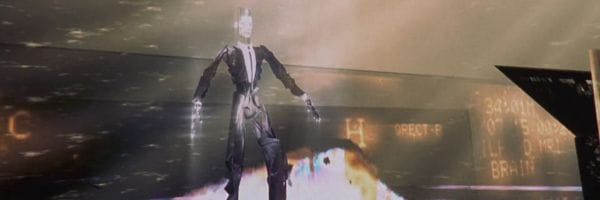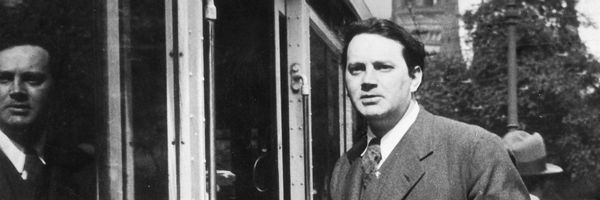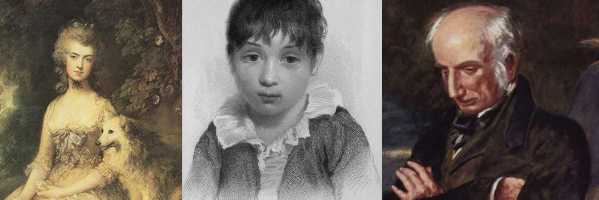Case Study: Best-Selling Novels, a Hit TV Series, and Two Stories from May 2020

Fiction has arrived in the present, though not all at once. If you read current best-selling fiction it may seem absurd to hear suggested that literature doesn't engage with the digital present or that there are distinct narrative challenges to incorporating our everyday technologies.
I recently gave a couple quick, crude overviews of new releases. Looking at new books being promoted from just Random House, then a list by LitHub of 20 recommended new books across publishers, you will find many perfectly fine books which nonetheless accumulate into a clear absence of the digital present. In discussing the latter list, I offer some explanation for the ways in which this absence occurs.
Outside these lists, there are exceptions. Tim Maughan's new collection Ghost Hardware covers digital topics explicitly. I also offer another case study of Percival Everett's new novel Telephone, which has a relatively more niche readership. Returning to best-sellers, though, if you have read Sally Rooney's Normal People or, for May 2020 releases, Emma Straub's All Adults Here or Jennifer Weiner's Big Summer, then you will have heard of things called phones. People talk on them, they text, film friends, check the time, and just generally have them on their persons. This is all very normal by now, but it's also been normal.
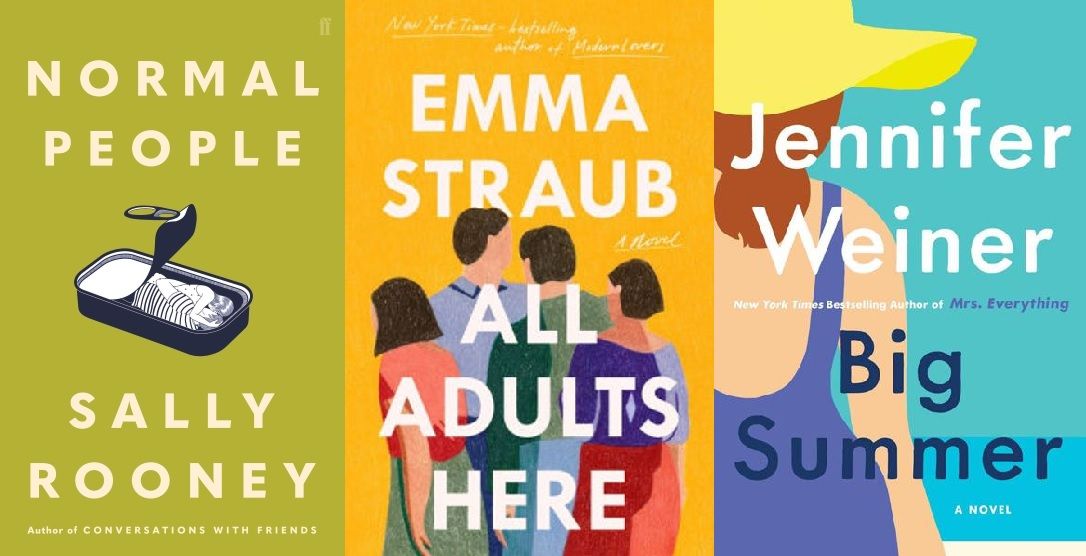
Laren Collins wrote in The New Yorker that Rooney "has assimilated online communication into a new kind of prose," and quotes Rooney's agent admiring how "totally naturally" Rooney does so. As the more recent examples show, such successes have made our decades-old practices suddenly into normal, increasingly common narrative occurrences.
In a more informal discussion of the new Random House releases, I ended with a comment about how so many people were living in this context and yet a profusion of novels, stories, and poems flood shelves and online removed from this setting. Though the works discussed above are best-sellers, these are still outliers in this way. We are approaching a point where that will cease to be true, but are still for now in a transitional moment.
Outside the best-seller list, text and e-mail are old news. The adoption rate of computers, the Internet, and smart devices is very high. Among that is a wide range of other actions done by millions every day. The success of Greg Daniels' new TV series Upload, also released this month, is an example of how ready people are to explore the broader range of digital experience in all its weirdness. Upload does so an exaggerated, satiric form, but that does not mean that other narrative styles are not possible, desirable, and fundamentally welcome.
Tales of Apps and Browsers
For a further glimpse into what is coming, we can look into a selection of shorter works: two short stories by Nicole Zhu. These were both published freely online on May 15, 2020, and are her first two works of published fiction, though she has done other work. The longer of the two stories, "There Is No Human Resources Department at the Candy Cooperative," was published by Catapult, an expansive magazine focused on nurturing emerging writers. The shorter story, "Keeping Tabs," was published by Jellyfish Review, which publishes new flash fiction (1,000 words or less) every week.
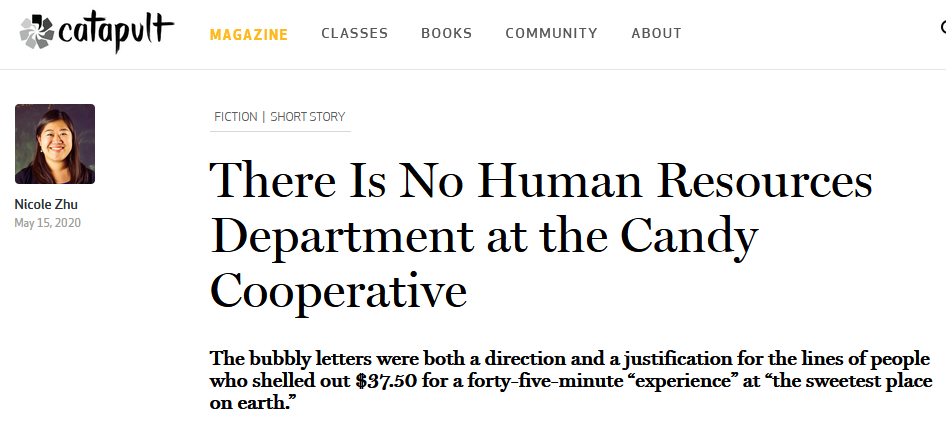
"There Is No Human Resources Department at the Candy Cooperative" feels only slightly exaggerated, not like near-future fiction, but like an intense present experience to which I remain blissfully unaware. One of the valuable things about story-telling is that I can then be dragged through this experience, but don't have to truly live it.
The two main elements of this story are Instagram culture and new forms of temporary, benefits-free work that emerges from a cultural desire for a rapidly shifting series of novel but shallow experiences. The Candy Cooperative is a pop-up museum designed to be an experience that everyone who is anyone (or likes to pretend to be) must be photographed and filmed in for Instagram.
There is a sizeable entry fee, as well as a gift shop to buy sweet and weird items. The high cost of entertaining activities in the city is a general concern. At one point, Alicia is noted to carefully weigh out the difference between $16 movie tickets at AMC and $18 tickets at Alamo Drafthouse, and later purchases a latte specifically noted to be $6. At the same time, her means of acquiring income are precarious, and the Cooperative offers no sense of worker protection. Following repeated harassment from a coworker – "the cousin of the boyfriend of the twenty-four-year-old woman who created The Candy Cooperative" – all Alicia can think to do is set the stage for a possible series of angry tweets to be leveled towards her employer. Instagram and Twitter as two social apps form the foundation for this ephemeral experience space's existence, and it is within them alone that Alicia is able to imagine anything being done.
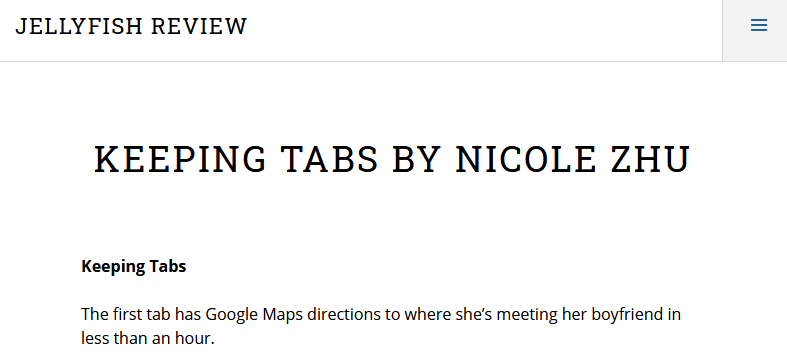
Instagram returns in "Keeping Tabs," but as one of a series of web browser tabs, not the app. The conceptual focus of this story is the end of a relationship told through a series of browser tabs starting from ones representing their plans to meet and leading toward evidence of infidelity. In traditional narratives, tension and story development are achieved through physically distant characters moving towards each other gradually. In older stories, information would have been exchanged across several chapters of characters meeting, conversations overheard, letters mailed, letters delivered, characters traveling, characters arriving, and waiting for the appropriate moment to speak on a certain subject with just the right selection of people.
In our hyperconnected age, such information is all online, readily available in an instant. It's the kind of context in which it makes sense that Zhu's narrator would almost believe that BuzzFeed quizzes could tell you anything new about you or your relationships. The narrator has all this information readily available as she sits at home, spread out across her computer screen. She's supposed to meet her boyfriend in "less than an hour," we find out in the story's first line. In narrative terms, it's almost hard to believe how much happens in that time, even though we all live it.
With this condensed timespan in mind, the story works well as flash fiction. The larger question for us, broadly, is: When narratives move this fast, how do we capture this sort of experience on a larger scale, such as a novel?
Here we see again how crafting narratives around contemporary digital life poses new challenges. Different things work in different styles or in different scales, but there is much more of our present existence still to be brought to life through literature. We can and must understand how to bring language and narrative to this life, and all the different ways it manifests globally.
To learn more about new fiction, literary trends, writing in the age of apps and browsers, and more, subscribe to my free monthly newsletter. I bring together the latest and greatest of my own writing, new literature, literary history, and a curated selection of other sources around the web. Sign up now and I will also be sending out an invite to a free mini-course delivered via email soon:


